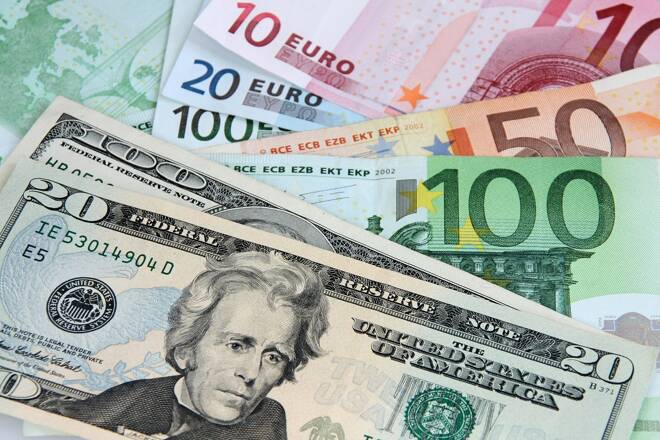Advertisement
Advertisement
ECB Surprise Hike Has No Effect on the EUR
Published: Jul 21, 2022, 15:39 GMT+00:00
For the first time in over 10 years, the European Central Bank (ECB) has made the decision to deliver an interest rate hike.
For the first time in over 10 years, the European Central Bank (ECB) has made the decision to deliver an interest rate hike in the wake of the deepening crisis with inflation, now at 8.6% across its 19 member countries. The move of 50 basis points was unexpected by both analysts and economists alike and was double the increase assured at the last monetary policy meeting in June, where rates at the time remained the same.
The interest rates on the marginal lending facility, the deposit facility, and the main refinancing operations were all increased by the same increment to 0.75%, 0.00%, and 0.50% respectively, putting an end to 8 years of negative rates, and will come into effect from the 27th of July.
In its statement, the Governing Council explained that it had been appropriate to take a more significant step in its path to policy rate normalization by frontloading the exit from negative interest rates, stating “the decision is based on the Governing Council’s updated assessment of inflation risks and the reinforced support provided by the TPI for the effective transmission of monetary policy.”
More hikes are already being forecasted in the months to come, as the target of 2% inflation for the medium term is still the goal of the Council. These increases will be determined on a meeting-by-meeting basis, the next of which is scheduled for the 8th of September.
Leading up to the announcement the euro was continuing its fall against the USD, boosted by the possibility of the Fed increasing its main interest rate by 75 basis points (or more?) next week – not forgetting that the consequence of the potential energy crisis in Europe is adding bearish pressure to the EUR.
EUR/USD & EurBund Sep2022 – Source: ActivTrader Online Trading Platform
High inflation is the main issue – and not only in Europe
This is the latest in a spate of increases seen in nearly every corner of the globe over the last few months. Many countries are having to navigate the same record-breaking inflation numbers whilst walking the tightrope of keeping their economies from sliding into recession.
The Federal Reserve (Fed) last month increased rates by 75 basis points and is tipped by economists to raise rates again by the same amount in July. The Bank of England increased rates from 1% to 1.25% last month and is slated to increase them again by 50 basis points at the next meeting after inflation hit a forty-year high of 9.4%.
The situation facing the ECB’s president Christine Lagarde is particularly high stakes, having to ensure a balance between the 19 euro countries with the weaknesses and debt burdens that they each carry.
Evidence of this is the current political turmoil in Italy, with the resignation being confirmed today of its Prime Minister, Mario Draghi, after three of the main partners in his coalition snubbed him in a confidence vote that he had initiated to try to repair their splitting alliance.
It now appears as though the country’s President, Sergio Mattarella, will be looking to call early elections in the coming months. The announcement triggered Italian bonds and stocks to be sold off sharply as a result and increased the cost of Rome’s borrowing.
Debt financing stress prompts new monetary policy
With Italy’s situation partly in mind, the Council also announced the approval of its “anti-fragmentation” program called the Transmission Protection Instrument (TPI), which will be used to counter unwarranted, disorderly market dynamics that threaten the way monetary policy can be transmitted smoothly across the Eurozone, allowing the ECB to ensure the delivery of its price stability mandate.
In her statement, Lagarde pointed to the flexibility in reinvestments of redemptions coming due in the pandemic emergency purchase program (PEPP) portfolio as the first line of defense against the risks to the transmission mechanism related to the pandemic.
Continuing in her statement, she cited the ongoing conflict in Ukraine as a major drag on economic growth, continuing pent-up supply relative to demand, and the rising cost of energy and everyday products as having a dampening effect on the economy. The Governor further commented that inflation was likely to “remain undesirably high for some time, owing to continued pressures in the pricing chain.”
Adding to the stress for citizens is the tightening of credit standards for all loan categories according to most recent bank lending survey reports. “Banks are expected to continue tightening their credit standards in the third quarter.” Said Lagarde.
The Governor reassured that there were reasons for some positivity though, indicating that there are signs of bottlenecks in supply improving, the labor market is remaining strong, many in the population were able to build on their personal savings during the pandemic, and with economies re-opening there is some hope that the tourism industry may start to rebuild and improve economic numbers in the third quarter of the year by supporting spending in the services sector. Unemployment is also at a historical low of 6.6 percent (May figures).
In summing up, Governor Lagarde further mentioned that the council was ready to adjust all of its instruments within its mandate to ensure that inflation was going to stabilize at the target of two percent over the medium term. But will it be enough?
About the Author
Carolane De Palmascontributor
Carolane's work spans a broad range of topics, from macroeconomic trends and trading strategies in FX and cryptocurrencies to sector-specific insights and commentary on trending markets. Her analyses have been featured by brokers and financial media outlets across Europe. Carolane currently serves as a Market Analyst at ActivTrades.
Advertisement
